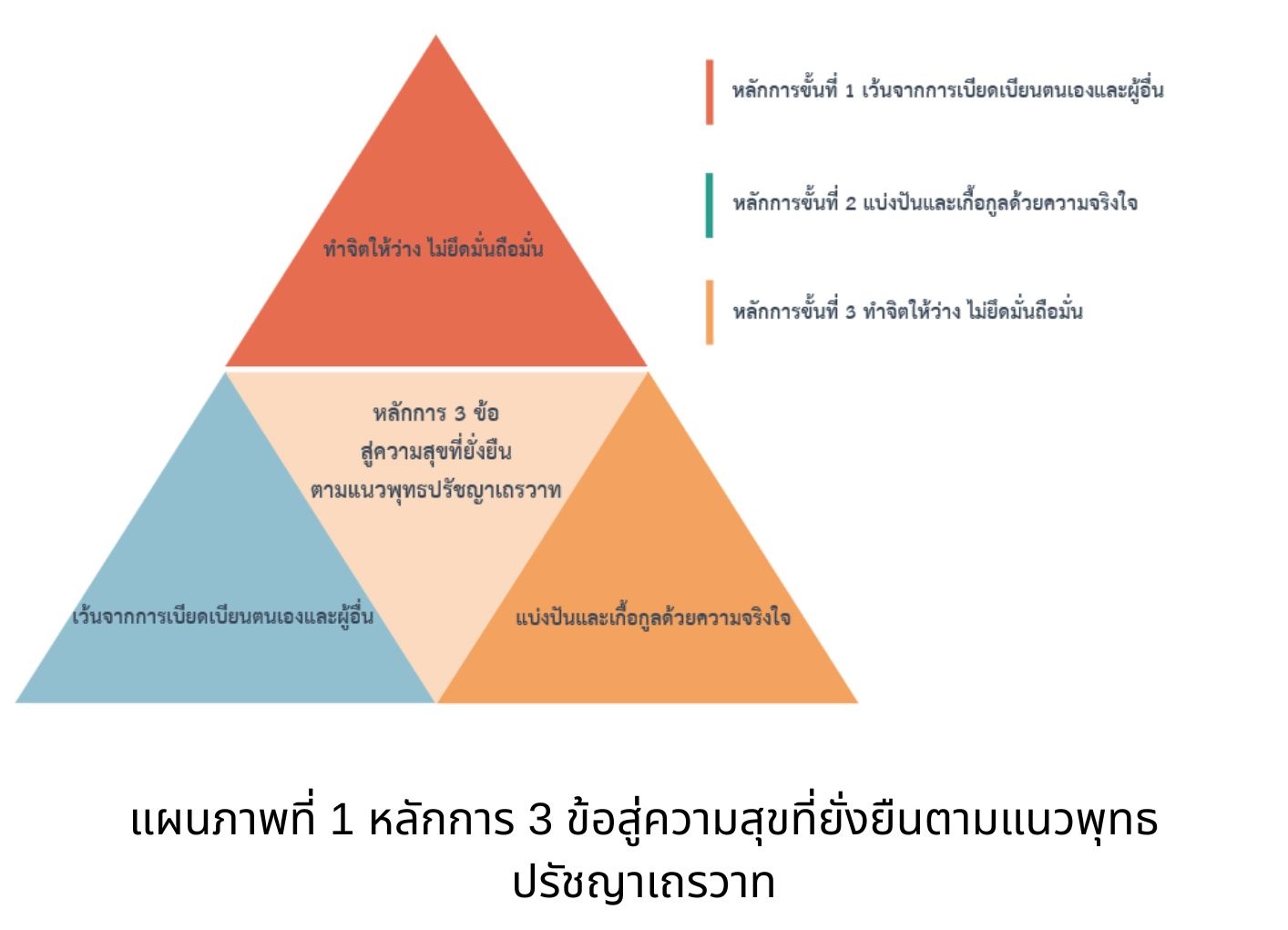การสร้างสุขภาวะตามแนวพุทธปรัชญาเถรวาท
คำสำคัญ:
สุขภาวะ, การสร้างสุขภาวะ, พุทธปรัชญาเถรวาทบทคัดย่อ
บทความวิชาการฉบับนี้มุ่งวิเคราะห์การสร้างสุขภาวะตามแนวพุทธ ผลการวิเคราะห์พบว่า สุขภาวะตามแนวพุทธปรัชญาเถรวาทคือความสุขที่เกิดจากการไม่เบียดเบียนตนเองและผู้อื่น สูงไปกว่านั้นคือเป็นความสุขที่เกิดจากการได้แบ่งปันเกื้อกูลผู้อื่นด้วยความจริงใจ และสูงไปกว่านั้นก็คือความสุขที่เกิดจากการหยั่งรู้ความเป็นจริง อันเกิดจากการทำจิตให้ว่าง คือ ว่างจากความกลัว ว่างจากความอยาก ว่างจากความคิด เห็นความเป็นจริง รู้สึกถึงสิ่งรอบตัวจริง ๆ การจะรู้สึกถึงสิ่งรอบตัวได้จำเป็นต้องสร้างสุขภาวะ ทำสมาธิอย่างถูกต้อง ไม่ยึดอยู่เพียงแค่การเพ่งในฌาน แต่ให้ขยายความรู้สึกตัวบนพื้นฐานของความสงบนั้นสู่สรรพสิ่งรอบข้าง รับรู้ลมหายใจเข้าออก รับรู้เสียงที่เข้ามากระทบ รับรู้อุณภูมิร้อนเย็นหรือลมที่เข้ามากระทบกาย แยกออกระหว่างความคิดปรุงแต่ง อัตตาที่เข้าไปยึดความคิดนั้น และตัวรู้ที่เข้าไปรับรู้ถึงความคิด รวมถึงอัตตาที่เข้าไปยึดว่าความคิดนั้นว่าเป็นสิ่งที่มีตัวตน หรือเป็นของ ๆ ตน การแยกแยะได้เช่นนี้ต้องอาศัยสมาธิ สติปัญญา ความพากเพียรอย่างต่อเนื่องจนสามารถเข้าใจ ยอมรับสภาพความเป็นจริงที่เกิดขึ้นตามธรรมชาติ จิตจึงจะปล่อยวางจากความทุกข์ที่เกิดจากตัณหา ความยึดมั่นถือมั่น สุขภาวะจึงเกิดขึ้นเพราะดับทุกข์ได้ เกิดความปลอดโปร่ง เบาสบาย คลายความยึดมั่นถือมั่น ตามหลักการ 3 ข้อสู่ความสุขที่ยั่งยืนตามแนวพุทธปรัชญาเถรวาท ได้แก่ 1) เว้นจากการเบียดเบียนตนเองและผู้อื่น 2) แบ่งปันและเกื้อกูลด้วยความจริงใจ และ 3) ทำจิตให้ว่าง ไม่ยึดมั่นถือมั่น
เอกสารอ้างอิง
กรมการศาสนา. (2525). พระไตรปิฎกภาษาไทยฉบับหลวง. กรุงเทพฯ : โรงพิมพ์กรมการศาสนา.
กีรติ บุญเจือ.(2551). คู่มือจริยศาสตร์ตามหลักวิชาการสากล.กรุงเทพฯ : ศูนย์ส่งเสริมและพัฒนาพลังแผ่นดินเชิงคุณธรรม.
ประเวศ วะสี. (2547). การบริหารจัดการภาครัฐแนวใหม่. กรุงเทพฯ : จุฬาลงกรณ์มหาวิทยาลัย.
รัตติกรณ์ จงวิศาล และคณะ. (2564). การทบทวนและการสร้างกรอบมโนทัศน์ของสุขภาวะทางปัญญาในคนวัยทำงาน. รายงานการวิจัย. กรุงเทพฯ : สำนักงานกองทุนสนับสนุนการสร้างเสริมสุขภาพ (สสส.).
สิริกุล กิตติมงคลชัย. (2562). การพัฒนามาตรวัดความสุขในการเรียนของนักเรียนมัธยมศึกษาตอนต้นในเขตกรุงเทพมหานคร. ปริญญาครุศาสตรมหาบัณฑิต. คณะครุศาสตร์ : จุฬาลงกรณ์มหาวิทยาลัย.
Boniwell, I. What is Eudaimonia? The Concept of Eudaimonic Well-Being and Happiness. [Online]. Retrieved from : http://positivepsychology.org.uk/pp-theory/eudaimonia
/34-the- concept-of-eudaimonic-well-being.html [29 November 2023].
Brickman, P., & Campbell, D. T. (1971). Hedonic relativism and planning the good society. In M. H. Appley (Ed.), Adaptation level theory : A symposium (pp. 287-302). New York : Academic Press.
Carr, A. (2004). Positive psychology : New worlds for old. Irish Psychologist, 30(11), 278-279.
Csikszentmihalyi, M., Abuhamdeh, S., & Nakamura, J. (2005). Flow. In Handbook of competence and motivation. New York : The Guilford Press.
Deci, E. L., & Ryan, R. M. (2008). Hedonia, eudaimonia, and well-being : An introduction. Journal of Happiness Studies, 9(1), 1-11.
Dhar, N., Chaturvedi, S. K., & Nandan, D. (2011). Spiritual health scale 2011 : Defining and measuring 4th dimension of health. Indian Journal of Community Medicine, 36(4), 275.
Diener, E., Sun, E. M., Lucas, R. E., & Smith, H. L. (1999). Subjective well-being : Three decades of progress. Psychological Bulletin, 125(2), 276.
Diener, Napa-Scollon, C. K., Oishi, S., Dzokoto, V., & Suh, E. M. (2009). Positivity and the construction of life satisfaction judgments : Global happiness is not the sum of its parts. Journal of Happiness Studies, 1(2), 159-176.
Diener, Oishi, S., & Lucas, R. E. (2003). Personality, culture, and subjective well-being : Emotional and cognitive evaluations of life. Annual review of psychology, 54(1), 403-425.
Hills, P., & Argyle, M. (2002). The Oxford Happiness Questionnaire : A compact scale for the measurement of psychological well-being. Personality and Individual Differences, 33(7), 1073-1082.
Joshanloo, M. (2016). Revisiting the empirical distinction between hedonic and eudaimonic aspects of well-being using exploratory structural equation modeling. Journal of Happiness Studies, 17(5), 2023-2036.
Keyes, C. L. (2002). The mental health continuurn : From languishing to flourishing in life. Journal of Health and Social Behavior, 43(2), 207-222.
Keyes, Shmotkin, D., & Ryff, C. D. (2002). Optimizing well-being : The empirical encounter of two traditions. J Journal of personality social psychology, 82(6), 1007.
Ryff, C. D. (1989). Happiness is everything, or is it? Explorations on the meaning of psychological well-Being. Journal of Personality and Social Psychology, 57(6), 1069-1081.
Seligman, M. (2002). Authentic happiness. New York : Free Press.
________. (2012). Flourish : A visionary new understanding of happiness and well-being. NY : Simon & Schuster.
Selim, S. (2008). Life satisfaction and happiness in Turkey. J Social Indicators Research, 88(3), 531-562.
Uhl, A. M. (2008). The Complete Idiot's Guide to the Psychology of Happiness. Penguin Group (USA) : DK Publishing.

ดาวน์โหลด
เผยแพร่แล้ว
รูปแบบการอ้างอิง
ฉบับ
ประเภทบทความ
สัญญาอนุญาต
ลิขสิทธิ์ (c) 2024 วารสารสถาบันพอดี

อนุญาตภายใต้เงื่อนไข Creative Commons Attribution-NonCommercial-NoDerivatives 4.0 International License.



